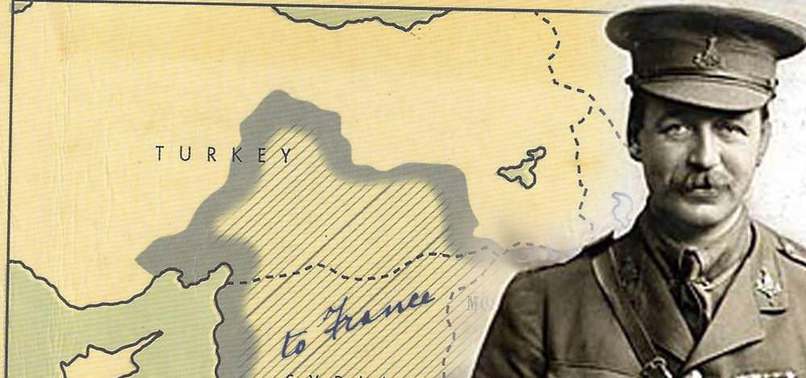He is one of those responsible for today's issues: Who is Mark Skyes?
The main reason for Mark Sykes' fame is that he conducted secret Sykes-Picot Agreement negotiations between England France and Russia on how to share the Middle East during the First World War.

The reason why Mark Sykes came to Paris, where he breathed his last in 1919, was his desire to attend the famous conference in which the lands of the Ottoman Empire would be shared among the imperial powers. However, he would not live long enough to see the tree he sowed the seed bloom.
On February 16, 1919, a man named Mark Sykes, who was in Paris to attend the Paris Peace Conference, died in his room at Hotel Le Totti on a Sunday, one of the millions of lives taken by the Spanish Flu.
Colonel Sir Tatton Benvenuto Mark Sykes, 6th Baronet (16 March 1879 – 16 February 1919) was an English traveler, Conservative Party politician, and diplomatic advisor, particularly with regard to the Middle East at the time of the First World War.
Mark Sykes, who was born as the only child of a rich and aristocratic family in London on March 16, 1879, used this privilege as necessary and accomplished many important works, which will be mentioned later, in his short life of only 40 years.
Although Skyes performed different professions throughout his life, such as writer, diplomat, soldier, and member of parliament, he was actually a traveler first and foremost. The trips he took with his father to the East when he was a child played an important role in shaping his personality and interests.
Mark Sykes, Britain's Middle East expert, was a member of the British Conservative Party, which gave his name to the Sykes-Picot Agreement in 1916.
On the other hand, Mark Sykes served his country with great devotion throughout his life - regardless of whether at the front or behind the front.
He participated as a soldier in the Second Boer War, which took place between 1899 and 1902 and fought in South Africa. After the end of the war, he was appointed private secretary to Irish Foreign Minister George Wyndham. However, Sykes was not happy with this position and wanted a job where he could do more and showcase his skills. For example, in a letter he wrote to his wife during this period, he said that "his life is no different from the life of a cat."
Sykes escaped from this rather stable life for someone who spent years traveling and left the war behind when he was appointed to the British Embassy in Istanbul. However, here too, he was assigned to daily tasks rather than political issues, which led to him being dissatisfied with his work.
For a while, Sykes had the dream of having a job that would be useful in the field in which he was equipped. However, Sykes's tenure at the embassy seriously affected his view of the Ottoman Empire. As a manifestation of this, he always argued that preserving the Ottoman territorial integrity was the best way for England's interests in those lands until the Ottoman Empire decided to enter the war on the side of Germany in World War I.
With the start of World War I in July 1914 and the Ottoman Empire's involvement in the war at the end of 1914, the British Government established the De Bunsen Committee. The task of this committee was to determine the policies to be followed against the Ottomans during and after the war. Lord Kitchener, then Minister of War, appointed Mark Sykes, whom he trusted for his knowledge of the Middle East geography and especially the Ottoman Empire, to the committee as his personal representative. Sykes was the only person on the committee who had lived in Ottoman territory and could provide first-hand information. For this reason, his presence on the committee was of great importance. In addition, while the war was continuing, Sykes carried out secret missions given to him by the government in the Middle East and the Balkans, examined the identities, cultures, and current conditions of the people living in those lands, prepared reports in this regard and presented them to the government.
Sykes fulfilled his duties properly and did not disappoint Kitchener's trust. This being the case, Kitchener gave Sykes the responsibility for the secret negotiations with France at the end of 1915. The talks were about how to share the Middle East after the war.
The Sykes-Picot Agreement, named after the British representative Mark Sykes and the French representative François-George Picot, who continued the negotiations, and although not fully implemented, has brought about various discussions in terms of intellectual infrastructure to this day, is the main reason for Mark Sykes' fame.
Another development that occurred during the Sykes-Picot Agreement was the change in Mark Sykes' perspective on Zionism. Sykes, who had previously been distant towards Jews, became a staunch supporter of Jews as a result of his meetings with Jewish notables such as Chaim Weizmann, Baron Edmund Rothschild, and Nahum Sokolow.
The reason why Mark Sykes came to Paris, where he breathed his last in 1919, was his desire to attend the famous conference in which the lands of the Ottoman Empire would be shared among the imperial powers. However, he would not live long enough to see the tree he sowed the seed bloom. Just like Lord Kitchener, who appointed him for the agreement that would go down in history, he died in a shipwreck in the north of England on June 5, 1916, the day the Arab Revolt started in the Hejaz...
